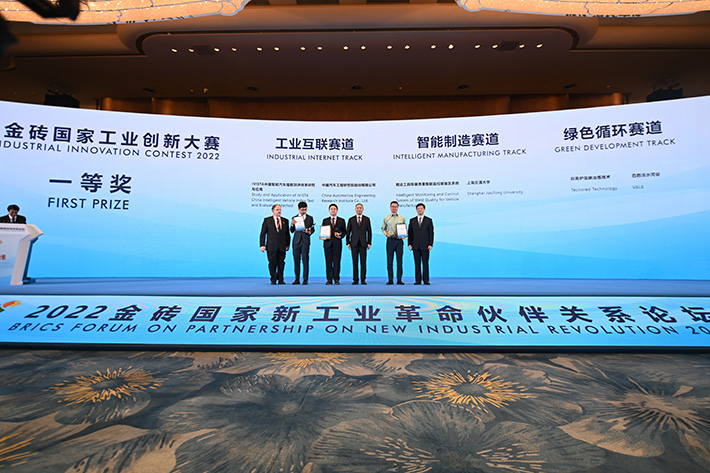|
||||||||||
| Home Nation World Business Opinion Lifestyle ChinAfrica Multimedia Columnists Documents Special Reports |
|
||||||||||
| Home Nation World Business Opinion Lifestyle ChinAfrica Multimedia Columnists Documents Special Reports |
| ChinAfrica |
| Digital Locomotives |
| BRICS countries strengthen cooperation in the field of digital economy |
| By Luca Belli | VOL. 15 August 2023 ·2023-08-11 |

An intelligent robot dog on display at an exhibition on the BRICS New Industrial Revolution in Xiamen, Fujian Province, on 8 September 2021
In 1990, a landmark report of the South Commission represented a defining moment for the Global South, calling for South-South cooperation and consecrating the theory of the “locomotives of the South.” The report emphasised that countries in the Global South could not expect former colonisers and imperialist forces to be the driver of their development. “The new locomotive forces have to be found within the South itself,” it argued.
Representing 41 percent of the global population, 25 percent of the global GDP and 20 percent of the global trade, it is hard not to consider the BRICS countries as such locomotives. Since the creation of the BRICS grouping, the number of governmental and multistakeholder meetings, partnerships, and initiatives organised by the grouping every year has been growing consistently. No head of state has ever missed an annual BRICS Summit.
Despite the remarkably challenging situation that global governance, supply chains, and diplomatic relationships are facing, the commitment of the BRICS countries to the grouping remains solid and unchanged. The BRICS countries continue to consider the group as a diplomatic priority and, despite their - sometimes - different opinions on several issues, they remain united in diversity.
More than 20 years after the creation of the BRICS acronym, the fundamental goal of the grouping remains unchanged: to build a multipolar order where global governance and development can be led by the Global South for the benefit of developing countries.
To achieve and enable such an ambitious goal, it has become clear to the BRICS and non-BRICS countries alike that digital technologies, digital governance, and digital policies have acquired a key role.

The first prize winners of the 2022 BRICS Industrial Innovation Contest and the award presenters pose for a group photo on 7 September 2022
Importance of technologies
The COVID-19 pandemic has been a reminder that digital technologies play an essential role in our societies and economies, and are a key enabler of literally any service, be it private or public. From education, national security and health to commerce and culture - most services are in the process of being digitised, and this trend is irreversible.
Over the past five years, largely because of recent COVID-19-induced shocks, the way people work, communicate and trade has changed dramatically. When the BRIC leaders met for the first time in 2009 (South Africa was not a member at that time), the terms “digital” or “cyber” were not even mentioned once in their first joint statement. These terms are mentioned 23 times in the 14th BRICS Summit Beijing Declaration, adopted on 23 June 2022.
Digital transformation is completely reshaping people’s lives at an unprecedented pace. This transformation brings incredible opportunities, as well as enormous challenges. In such a context, the BRICS countries have demonstrated to be not only the “locomotives of the South,” but also to be able to act as drivers of innovation in terms of both digital technologies and digital governance.
In less than a decade, the BRICS countries have evolved into regional or global leaders in digital technologies. For example, China, India and Brazil have turned from being amongst the least connected countries in the world to global leaders in online payments in a short span of eight years. Together, the BRICS countries have the potential to be the “digital locomotives” of the Global South.
Innovative governance
Since the revelations of former NSA contractor Edward Snowden, the BRICS countries have also promoted numerous governance initiatives aimed at fostering global digital cooperation.
In the aftermath of the Snowden revelations, Brazil convened the Global Multistakeholder Meeting on the Future of Internet Governance, better known as “NETmundial,” held in São Paulo in 2014, which adopted an ambitious Multistakeholder Declaration. Unfortunately, time has demonstrated that ambition alone is insufficient and must be accompanied by resources and stability to produce meaningful outcomes.
Aware of this, China launched, also in 2014, a new global effort aimed at fostering cyberspace governance, the World Internet Conference, also known as Wuzhen Summit. The conference, which is organised by Chinese authorities and held annually, provides a valuable venue for stakeholders to discuss solutions on a plethora of issues related to digital technologies.
India has also been the host of the Global Conference on Cyberspace in 2017; Russia has been organising its mega Artificial Intelligence Journey conference since 2019; and South Africa has emerged as the most active African country in most Internet governance venues.
Importantly, in July 2022, the First BRICS Digital Forum was organised under the Chinese presidency of the grouping, thus providing an extraordinary opportunity to BRICS countries to further discuss their approaches to digital technologies and governance, and identify common grounds to enhance cooperation.

Visitors experience TCL’s cellphone products at the Eletrolar Show 2022 in São Paulo, Brazil, on 11 July 2022
Towards Legal Interoperability
The initiatives spearheaded by the BRICS countries demonstrate not only the enormous importance they attach to digital technologies and governance, but also the convergence of normative frameworks. It is increasingly evident that BRICS have understood the value of interoperable digital technologies, allowing to exchange information and access or provide services globally, as well as interoperable norms, facilitating international trade while preserving national and digital sovereignty.
Preserving sovereignty and fostering openness are and should be seen as compatible goals if they are supported by legally interoperable frameworks. Legal interoperability can be achieved via many strategies, fostering convergent norms, and providing similar levels of protection for users and similar obligations for producers of digital goods and providers of digital services.
Such legal interoperability should be the basis of BRICS efforts to enhance their digital cooperation, while offering an alternative model of digital governance, driven by the Global South and aimed at openness and inclusiveness. Importantly, as the work of the CyberBRICS Project has demonstrated, many digital policies and norms in the BRICS countries are already remarkably compatible.
Despite their differences on some issues, the BRICS countries have demonstrated incredible strength when acting together. For instance, establishing the BRICS-led New Development Bank is universally considered as a remarkable achievement.
Even on traditionally thorny issues such as cybersecurity governance, they can reach consensus. The BRICS countries were represented among the 25 states which appointed experts in the UN Group of Governmental Experts on Responsible State Behaviour in Cyberspace, which produced a consensus report in July 2021.
The same year, the BRICS Summit New Delhi Declaration issued as the main outcome of the 13th BRICS Summit called for the establishment of “legal frameworks of cooperation among BRICS States… [and] a BRICS intergovernmental agreement on cooperation.”
Considering this context, there is an incredible potential for the BRICS countries to become the digital locomotives of the Global South. The BRICS countries have the strength, the relevance and the creativity to offer a Global South-led model of digital governance. As Brazilian President Luiz Inácio Lula da Silva once said, the logic behind BRICS is “to do something different and not copy anybody.”
| About Us | Contact Us | Advertise with Us | Subscribe |
| Copyright Beijing Review All rights reserved 京ICP备08005356号-5 京公网安备110102005860号 |